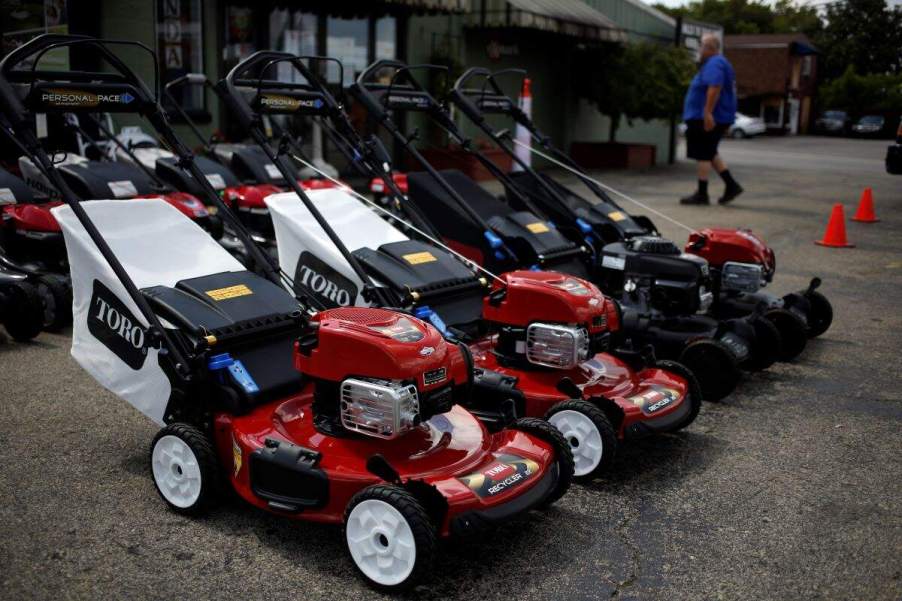
Electric vs. Gas Lawn Mowers: Which Is Best for You?
It’s getting to be that time of year when winter becomes a distant memory, and thoughts turn to outdoor lawn care. If you are looking for a new lawn mower, you may be trying to decide which is best for you: an electric vs. gas lawn mower.
Each type offers distinct advantages and disadvantages, depending on several factors, such as the size of your property, accessibility to a power source, and more. While a corded electric mower may be ideal for a homeowner with a small yard, it could be a nightmare for someone with a lot of grass to mow. Understanding the differences between electric and gas lawn mowers will help determine the best option for maintaining your yard.
The benefits of owning an electric lawn mower

Electric lawn mowers are available in cordless battery-powered or electric corded models, with each type offering a unique set of benefits.
Battery-powered lawn mowers are the most common style because they are lightweight and easier to maneuver around a yard, able to navigate tight spaces with ease. Routine maintenance is minimal, requiring only a charged battery and sharp blade. This type of lawnmower is the perfect choice for property owners that don’t have a lot of grass to cut and don’t need to battle challenging terrain.
Homeowners living in small urban spaces may prefer a corded electric lawn mower. There are no batteries or gas engines to worry about, making it more affordable than other lawn mowers. It also requires less maintenance and is the most eco-friendly choice.
Electric lawn mowers are also a good option for people concerned about noise pollution. According to Tractor Supply Co., “The general decibel level of an electric mower is about 75 dB, while gas mowers are around 96 dB. It may not sound like much, but it’s comparable to the noise of a running washing machine to the sound of a motorcycle.”
Electric vs. gas lawn mowers
Electric lawn mowers, however, are not ideal for everyone. A battery-powered lawn mower will only operate efficiently for 30 to 60 minutes before it runs out of power. Someone with a big yard will probably find it aggravating to wait for the battery to recharge before finishing their yard work.
Corded models can also be cumbersome, especially when the cord gets tangled in flower beds, fences, and other obstacles. Most corded electric models have limited reach, restricting how far you can move away from the power source without requiring an extension cord. Property owners with larger yards may find it hard to be tethered to an electrical outlet. Electric lawn mowers also do not provide as much power as gasoline lawn mowers, making it harder to conquer difficult areas of the yard.
When comparing electric vs. gas lawn mowers, most consumers still prefer the power of a traditional gas mower, especially if their yard is 1/3 acre or more. A gas-powered lawn mower can handle leaves, wet grass, uneven terrain, and tall grass much more efficiently than its electric counterparts. It can also cut approximately 14,000 square feet on a single tank of gas without having to stop to look for a longer cord or recharge a battery.
The downside of gas-powered lawn mowers is the constant maintenance of carburetors, spark plugs, air filters, and more. Oil, fuel, and other lubricants can be a chore to clean up, and many consumers find the starter cord hard to pull, preferring the simplicity of the push-button start of an electric model.
While gas-powered lawn mowers require significantly more maintenance than electric models, they will typically last about 10 years compared to the five-year lifespan of an electric lawn mower.
Choose a lawn mower that meets your needs
The bottom line is it comes down to what’s important to you. If you don’t have the time or desire to maintain expensive lawn equipment, then an electric lawn mower may be your best option. If you want to reduce your carbon footprint, corded electric mowers offer the best sustainability since there is no reliance on gasoline or lithium-ion batteries as a power source.
For property owners with large yards, a gas-powered lawn mower will provide more power and versatility, allowing you to cut more surface area in less time without the hassle of a battery or long cord.
Whatever type of lawn mower you choose, enjoy the spring air and the pleasant smell of freshly cut grass.


